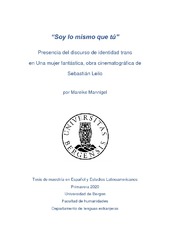“Soy lo mismo que tú” Presencia del discurso de identidad trans en Una mujer fantástica, obra cinematográfica de Sebastián Lelio
Master thesis
Permanent lenke
https://hdl.handle.net/1956/22555Utgivelsesdato
2020-06-12Metadata
Vis full innførselSamlinger
- Master theses [201]
Sammendrag
La presente tesis de maestría constituye un análisis de la presencia del discurso de identidad trans en el cine chileno. A partir del caso que ofrece la película Una mujer fantástica (2017) se examina la identidad trans de una mujer en Chile. La película de Sebastián Lelio se centra en la vida de Marina, una mujer trans (interpretada por Daniela Vega, una actriz trans) y aborda los desafíos que la protagonista tiene que enfrentar por su identidad de género después de la muerte de su pareja. El objetivo de esta investigación es mostrar con qué elementos y cómo está representada la identidad de la mujer trans a través de la película. También trata de responder cómo la película puede contribuir a la discusión pública. El marco teórico se crea con la ayuda de estudios queer, las ideas postestructuralistas de los teóricos Michael Foucault, Judith Butler y Eve Kosofsky Sedgwick y la reflexión en torno al género fantástico de Tzvetan Todorov. Además, la teoría del cine semiótico y psicoanalítico forma una base importante para la investigación. El análisis de los distintos elementos muestra que los componentes como los ajustes de la cámara en primer plano de la protagonista, la música y los símbolos como la cascada o el espejo son importantes para la representación de la identidad de la mujer trans. En mi opinión, la película crea una imagen versátil y auténtica de una mujer trans en Chile. Sin una actuación exagerada, violencia explícita o llanto hiper dramático, se muestra una serie de retos que una mujer trans tiene que enfrentar en su vida cotidiana. This thesis is an investigation of the presence of the trans identity discourse in Chilean cinema. Based on the case offered by the film A Fantastic Woman (2017), the trans identity of a woman in Chile is examined. The film directed by Sebastián Lelio, focuses on the life of Marina, a trans woman (played by Daniela Vega, a trans actress) and addresses the challenges that the protagonist must face because of their gender identity after the death of her partner. The objective of this research is to show with what elements and how the identity of a trans women is represented through the film. It also tries to answer how the film can contribute to the public discussion. The theoretical framework is created with the help of queer theory, the ideas of the poststructuralist theorists Michael Foucault, Judith Butler and Eve Kosofsky Sedgwick as well as Tzvetan Todorov's assumption about the fantasy genre. Furthermore, the theory of semiotic and psychoanalytic film analysis forms an important basis for the research. The analysis of the elements shows that components such as the camera settings like close-ups of the protagonist, the music, and symbols such as the waterfall or the mirror are important for the representation of the identity of the trans woman. In my opinion, the film, creates a versatile and authentic image of a trans woman in Chile. Without exaggerated acting, explicit violence, or over the top crying, the film shows what a trans woman must face in her daily life.
